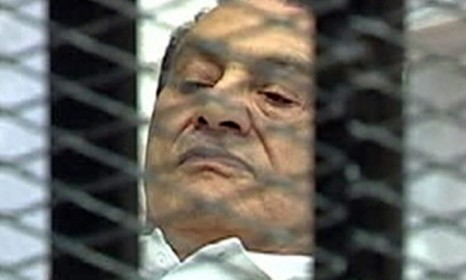The Mubarak trial: Justice or revenge?
Egypt's ailing former leader is finally going to court for corruption and the killing of protesters — and his nation's future may ride on the trial's outcome

A free daily email with the biggest news stories of the day – and the best features from TheWeek.com
You are now subscribed
Your newsletter sign-up was successful
Former Egyptian President Hosni Mubarak, 83, who is reportedly suffering from cancer, was wheeled into a Cairo courtroom on a hospital bed on Wednesday, to face charges of engaging in corruption and ordering the killing of protesters during the 18-day uprising against his reign. He denied the allegations "categorically." If found guilty, the frail octogenarian, who ruled Egypt for 30 years, could face the death penalty. What does Mubarak's trial mean for Egypt's future?
This is a crucial test in Egypt's transformation: Millions of Egyptians are accustomed to seeing Mubarak portrayed on TV as a nearly divine figure, says Leila Fadel in The Washington Post. They'll now watch, via live broadcast, as he faces justice in the defendant's cage. The high-drama proceedings will also be "an important test of a judicial system that was once subservient" to the toppled leader, and give us a glimpse of how much reform the Arab Spring has really brought about.
"Mubarak trial a 'decisive moment' for Egypt"
The Week
Escape your echo chamber. Get the facts behind the news, plus analysis from multiple perspectives.

Sign up for The Week's Free Newsletters
From our morning news briefing to a weekly Good News Newsletter, get the best of The Week delivered directly to your inbox.
From our morning news briefing to a weekly Good News Newsletter, get the best of The Week delivered directly to your inbox.
But will Egyptians get justice, or just revenge? Democratic reforms in Egypt could get a boost if the trial offers a "comprehensive airing of Mubarak's sordid, authoritarian legacy," says Thanassis Cambanis at The Atlantic. But if "we see a perfunctory inquest and speedy, shallow trial," the nation won't get true justice — just revenge against the despot. And such an expedient victory won't help Egypt's reformers further their cause.
"Mubarak's trial could be a sign of what's to come for Egypt's future democracy"
Just seeing Mubarak in the dock is a victory: Of course, the result of the trial will be hugely important, says Alastair Beach at The Daily Beast. But many Egyptians were skeptical they would ever see this day, even after protests ended Mubarak's 30 years in power. Egypt is "the Arab world's most important country," and Wednesday's court appearance marked "an unprecedented fall from grace in a region not known for bringing many of its manifold autocrats to heel." That in itself is a win for protesters.
A free daily email with the biggest news stories of the day – and the best features from TheWeek.com
But the trial imperils Egypt's fragile peace, too: This is "a dangerous time to bring Hosni Mubarak to justice," says Jeffrey Fleishman at the Los Angeles Times. No matter how the trial goes, it could threaten Egypt's stability. On the one hand, the military council that replaced him can't afford to let too many damning government secrets emerge in case the council gets discredited. On the other, "any move that appears to allow Mubarak to slip from justice is sure to provoke an outraged backlash."
"Upcoming Mubarak trial a prism for Egypt's contending passions"
-
 Political cartoons for February 22
Political cartoons for February 22Cartoons Sunday’s political cartoons include Black history month, bloodsuckers, and more
-
 The mystery of flight MH370
The mystery of flight MH370The Explainer In 2014, the passenger plane vanished without trace. Twelve years on, a new operation is under way to find the wreckage of the doomed airliner
-
 5 royally funny cartoons about the former prince Andrew’s arrest
5 royally funny cartoons about the former prince Andrew’s arrestCartoons Artists take on falling from grace, kingly manners, and more